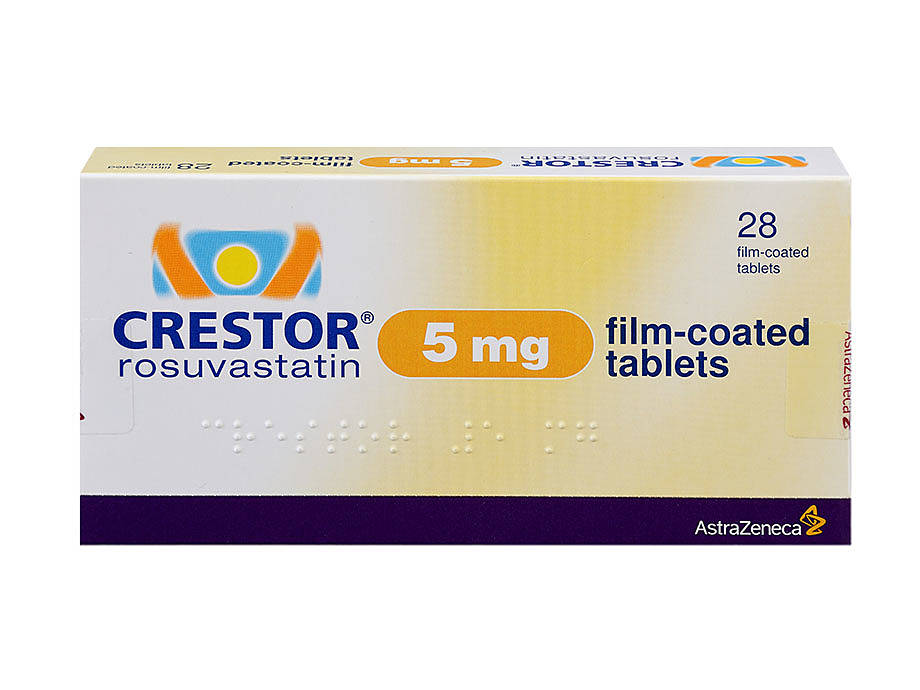Crestor
Order Consultation for High Cholesterol Treatment


Crestor contains rosuvastatin used to treat patients with high cholesterol in their blood. If you have been taking Crestor for at least three months, you can order a repeat prescription from one of our doctors at ZAVA Ireland.
To place a prescription order for high cholesterol treatment, fill in our brief questionnaire. You can choose a preferred treatment, such as Crestor.
One of our doctors will check if the medication is suitable for you and issue your prescription to a local pharmacy in Ireland or your home address. Alternatively, you can choose to have your medication delivered directly to your door.
A consultation for high cholesterol treatment prescription costs €21.50.



About Crestor
What is Crestor?
Crestor belongs to a family of statin drugs, which are used to treat high blood cholesterol.
How does Crestor work?
The active ingredient of Crestor is called rosuvastatin, which is a type of statin. Statins lower your cholesterol levels by reducing the amount of LDLs (low-density lipoproteins) and triglycerides (fatty substances) in the bloodstream.
In addition, statins increase the amount of HDLs (high-density lipoproteins), which are good as they remove cholesterol from the cells and arteries and carry it to the liver.
Should I alter my diet whilst taking Crestor Rosuvastatin?
Yes. To make the treatment as effective as possible, you should make your diet healthier. You need to reduce the amount of high cholesterol and high fatty foods you consume and exercise regularly. You should be able to receive advice from ZAVA or your doctor on how to control your diet while taking Crestor.
Am I allowed to smoke whilst taking Crestor?
You should quit smoking if you have high blood cholesterol. Smoking can contribute to causing high blood cholesterol levels. To make the treatment as effective as possible, you need to avoid smoking or second -hand smoking. To get advice on how to quit, speak to your local GP.
Am I allowed to drink alcohol whilst taking Crestor?
You can drink within the recommended limits of alcohol while taking Crestor. But, this medication shouldn’t be used if you drink excessive amounts of alcohol.
You can ask ZAVA or your GP for more advice about taking Crestor and drinking alcohol.
Are any foods banned whilst taking Crestor?
Yes. You should avoid grapefruit and juices that contain grapefruit. Grapefruit contains chemicals which may increase the number of statins in the blood. This will not make the treatment more effective and can even cause some serious damage, so avoid eating grapefruit while taking rosuvastatin.
Can I still take vitamin tablets as usual?
This will depend on what is in your vitamin tablets. You should tell a pharmacist that your Crestor medication may interact with nicotinic acid or preparations containing nicotinic acid.
Who usually takes Crestor?
You must have a prescription to take Crestor. It could be prescribed as a treatment for patients with high blood cholesterol, or as a preventative measure to reduce hardening of the arteries. Crestor does not tend to be suitable for patients over aged 70 or children. You should not take Crestor if you are pregnant or breastfeeding. For a full list of who can and can’t take Crestor, read the patient information leaflet that comes with your medicine package.
Is this a prescription treatment?
Yes. You can get a prescription for this from ZAVA or your GP.
How do I know if the treatment is working?
Since high blood cholesterol has no real symptoms in the first place, it can be difficult to tell whether the treatment is working. Your GP will usually arrange a blood test around 3 months after you start treatment to see if your levels have reduced by the right amount.
How effective is Crestor?
Cholesterol levels will decrease within the first few months of treatment. The risk of heart attack will be reduced by about 10% after the first year of treatment, rising to around 33% after three years.
What do the tablets look like?
The 5mg tablets are yellow and round. The 10mg and 20mg tablets are pink and round. The 40mg tablets are pink and oval. All the tablets are marked with the dosage amount.
Crestor Dosage
You will usually be started with a 5mg daily dose of Crestor. This may be increased by your doctor depending on how well you respond to the treatment. The maximum daily dosage is 40mg. The maximum daily dosage for children is 20mg.
You should swallow the tablet whole at the same time daily, with a glass of water. You can take the tablet with or without food.
If you forget a tablet, take it as soon as you remember. However, if it is near the time of your next scheduled dose, skip the missed dose and continue treatment as normal.
If you accidentally take more tablets than you should, seek medical assistance immediately.
What does Crestor contain?
Rosuvastatin is the active substance in Crestor. The tablets contain rosuvastatin calcium equivalent to 5 mg, 10 mg, 20 mg or 40 mg of rosuvastatin, depending on the dosage of the tablet. The tablets also contain lactose monohydrate, microcrystalline cellulose, calcium phosphate, crospovidone, magnesium stearate, hypromellose, triacetin, titanium dioxide (E171). The Crestor 10 mg, 20 mg and 40 mg tablets also contain red iron oxide (E172). Crestor 5 mg film-coated tablets also contain yellow iron oxide (E172).
Crestor Side Effects
You should stop taking Crestor immediately if you experience:
- Allergic reactions (difficulty breathing, swollen face, lips, tongue and throat, severely itchy skin)
- Prolonged and unexplained muscle aches and pains (this may develop into potentially life-threatening muscle damage)
Common Crestor side effects include:
- Headache
- Stomach pain
- Constipation
- Nausea
- Muscle pain
- Feeling weak
- Dizziness
Uncommon Crestor side effects include:
- Rash, itching or other skin reactions
- High protein levels in the urine (this will usually return to normal over the course of the treatment, or at least once treatment has ended)
Rare side effects include:
- Severe allergic reaction
- Muscle damage
- Severe stomach pain
- Increased liver enzymes in the blood
- Jaundice
- Hepatitis
- Traces of blood in the urine
- Damage to nerves in the legs and arms
- Joint pain
- Memory loss
- Breast enlargement
If you experience any of these side effects (or any others) and are concerned, you should speak to your doctor.
Crestor Interactions
Do not take Crestor if you:
- are allergic to Crestor
- are pregnant or breastfeeding
- have liver disease
- have severe kidney problems
- have unexplained and prolonged muscle aches or pains
- are taking ciclosporin (used after organ transplants)
You should not take 40mg of Crestor daily if:
- your thyroid gland is not working properly
- you drink heavily
- you are of Asian origin
- you take fibrates (other medicines to lower cholesterol)
You should tell your doctor if you are:
- under 10 years old
- over 70 years old
- taking HIV treatment
- under 18 (you should not be taking the 40mg dosage)
You need to tell your doctor if you are taking any of the following medicines:
- Ciclosporin (used after organ transplants)
- Warfarin (or any other blood thinners)
- Fibrates (gemfibrozil, fenofibrate: used to lower cholesterol)
- Indigestion remedies
- Erythromycin (antibiotic)
- Contraceptive pill
- Hormone replacement therapy
- Ritonavir, Lopinavir, Atazanavir (used to treat HIV infection)
Crestor should not affect your ability to drive or operate machinery. However, do not undertake these activities before you know how Crestor affects you.
Crestor contains lactose. You should inform your doctor if your body is intolerant to some sugars.

Dr Kathryn Basford is an IMC and GMC registered GP who works with our Irish team here at ZAVA. She graduated from the University of Manchester and completed her GP training at Whipps Cross Hospital in London.
Meet our doctorsLast reviewed: 04 Apr 2019
